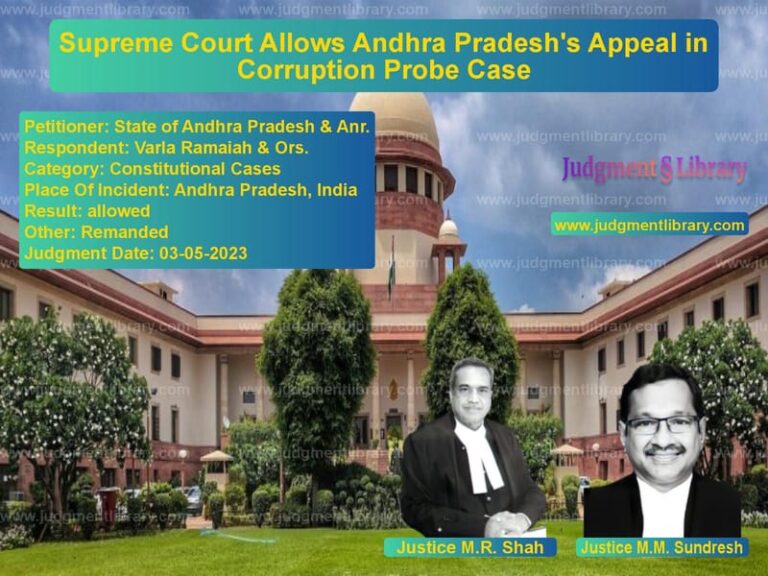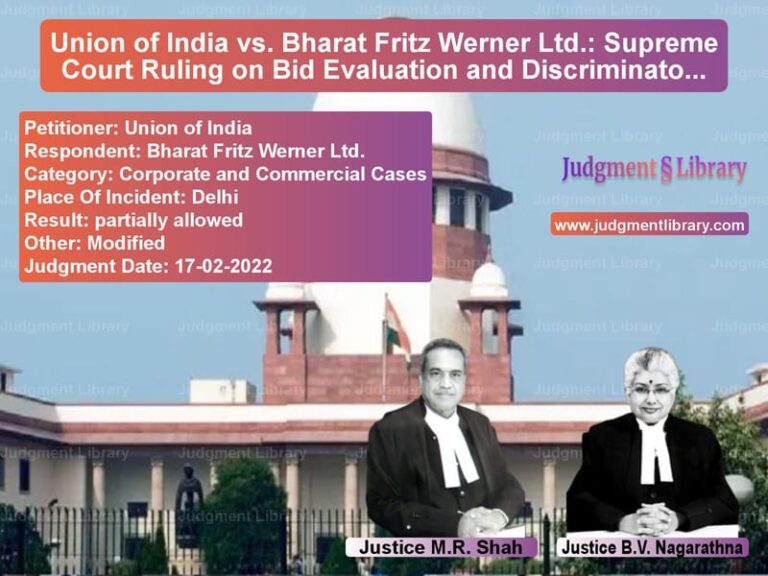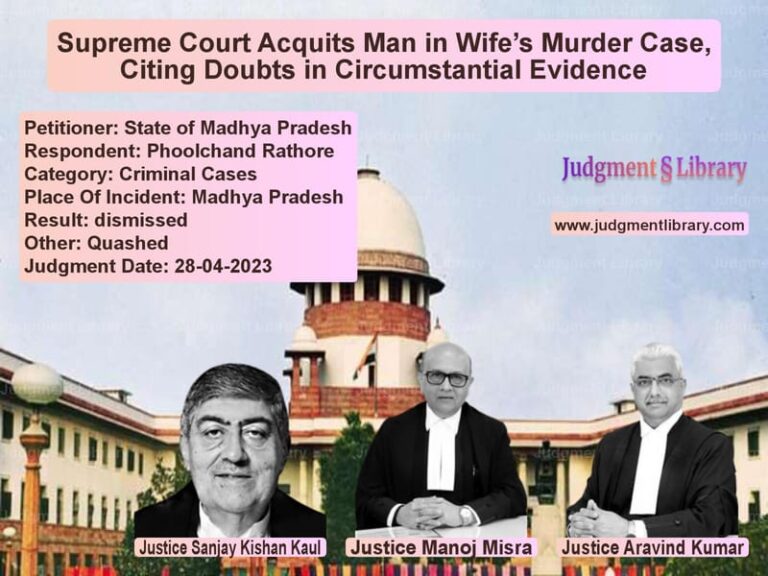Interest Claims by Flat-Owners in Kerala Coastal Demolition Case: Legal Insights
This case arises from the demolition of four building complexes in Ernakulam, Kerala, which were constructed illegally. The Kerala State Coastal Zone Management Authority filed an appeal against the Maradu Municipality and other respondents regarding the issue of interest claimed by flat-owners on the amounts they paid to the builders for their flats. The matter was first brought before the Supreme Court through a suo-motu action for monitoring the compliance with the earlier judgment, and it also addressed the issue of compensation for the displaced flat-owners.
The flat-owners, who were evicted when their flats were demolished, sought compensation in the form of the amounts they had paid to the builders, along with interest on those amounts. The flat-owners had made investments over a period of several years, and the demolition had deprived them of their homes. The issue was further complicated by the escalation in property prices and the costs associated with finding alternative accommodation. A specific claim for interest was raised by the flat-owners, many of whom argued that they had lost their life savings and had to pay rent after their flats were demolished.
Petitioner’s Arguments
The petitioner, representing the Kerala State Coastal Zone Management Authority, argued that the flat-owners had been in possession of the flats for an extended period, from 2009 to 2013, and that they had already benefited from the investment. The petitioner further pointed out that the flat-owners still held the undivided share in the land, which had appreciated significantly in market value. It was argued that the flat-owners had already enjoyed the benefit of their investment and, therefore, should not be entitled to any interest on the amounts paid to the builders. Additionally, the petitioner pointed out that the demolition had been ordered due to the illegal nature of the buildings, and thus the flat-owners should not receive interest payments for the period of possession.
Respondent’s Arguments
On the other hand, the respondents, represented by the flat-owners, contended that they had invested significant amounts in purchasing the flats, and many of them had taken out loans to finance these purchases. The flat-owners argued that they had paid for the flats between 2007 and 2013, and after occupying the flats, they had to vacate them in 2019 due to the demolition. The respondents claimed that they were entitled to interest on the amounts they had paid to the builders, citing the financial hardships they had faced, including paying rent for alternative accommodation and the escalating cost of property. They also argued that the compensation they received from the government was inadequate, as it only covered the principal amount without accounting for inflation or the market value of the property.
Court’s Analysis and Conclusion
The Supreme Court carefully considered the arguments from both sides and the facts surrounding the case. The Court reviewed the compensation process that had been put in place, noting that the State Government had already paid Rs. 25 lakhs as interim compensation to each of the flat-owners, except for the residents of the Holy Faith H2O building, for whom no amount had been paid. The Court acknowledged that while the flat-owners had received the amount they paid for their flats, this amount did not reflect the current market value, and the flat-owners had not been compensated for the appreciation of land value or the loss of their place of residence.
The Court also discussed the legal definition of interest as compensation for the deprivation of money and the loss of the right to its use. However, it referred to previous rulings such as in the case of Allahabad Bank v. Bengal Paper Mills Company and Central Bank of India v. Ravindra, which emphasized that interest is compensation for the loss of money, and whether or not interest should be awarded depends on the circumstances of the case.
In this case, the Court found that the flat-owners had enjoyed possession of the flats for an extended period, which meant they had benefited from their investment. Moreover, the land, which was now owned by the flat-owners as joint owners, had appreciated in value over time. The Court further noted that the flat-owners had been well aware of the illegal nature of the buildings, as they had received show-cause notices from authorities. Therefore, the Court ruled that the flat-owners were not entitled to any interest on the amounts they had paid to the builders.
Final Decision
The Supreme Court ultimately ruled that the claim for interest by the flat-owners was not justified. The Court held that while the flat-owners had a valid claim for compensation, they were not entitled to interest on the amounts paid to the builders. The ruling emphasized the fact that the flat-owners had already enjoyed the benefits of their investment over a period of years and that the land they owned had appreciated in market value. The Court’s decision reinforced the principle that compensation for the deprivation of money should be carefully evaluated based on the specifics of each case, particularly when the asset involved had been enjoyed for a substantial period.
Petitioner Name: Kerala State Coastal Zone Management Authority Member Secretary.Respondent Name: Maradu Municipality & Ors..Judgment By: Justice L. Nageswara Rao, Justice B. R. Gavai.Place Of Incident: Ernakulam, Kerala.Judgment Date: 13-05-2022.
Don’t miss out on the full details! Download the complete judgment in PDF format below and gain valuable insights instantly!
Download Judgment: kerala-state-coastal-vs-maradu-municipality-supreme-court-of-india-judgment-dated-13-05-2022.pdf
Directly Download Judgment: Directly download this Judgment
See all petitions in Damages and Compensation
See all petitions in Property Disputes
See all petitions in Contract Disputes
See all petitions in Judgment by L. Nageswara Rao
See all petitions in Judgment by B R Gavai
See all petitions in dismissed
See all petitions in supreme court of India judgments May 2022
See all petitions in 2022 judgments
See all posts in Civil Cases Category
See all allowed petitions in Civil Cases Category
See all Dismissed petitions in Civil Cases Category
See all partially allowed petitions in Civil Cases Category







